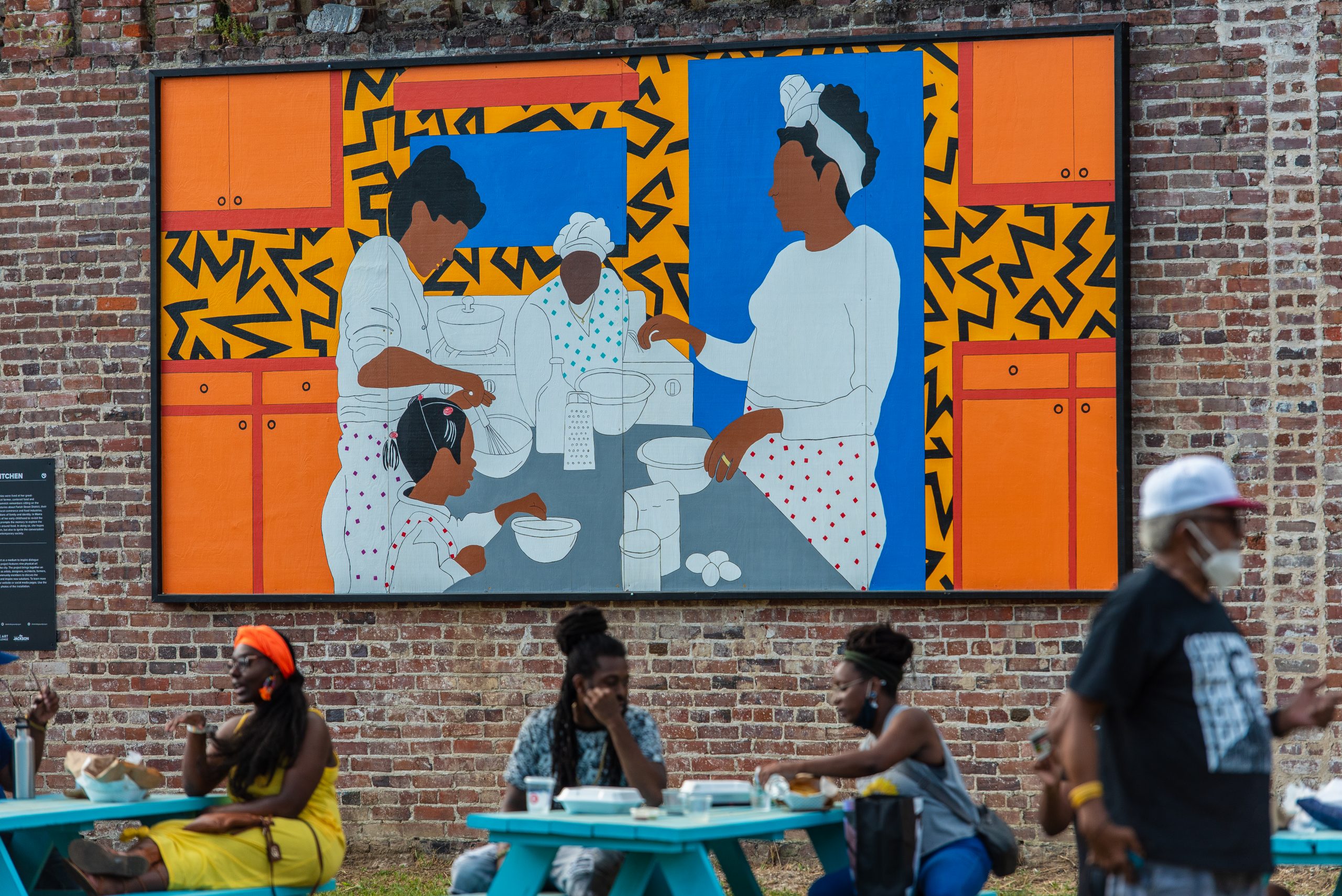“The good china was all that was left.”
Silbrina Wright vividly remembers standing in a home in the lower ninth ward of New Orleans after Katrina. The house was nearly completely destroyed. Studs and intermittent spots of hanging insulation were the only thing left of the walls. The furniture and curtains likely washed away with the receding floodwaters. Wright stood in the middle of the room and slowly took in the devastation.
All that remained amid the devastation was the china reserved for special occasions. She reached in her pocket for her phone and dialed her fiancé.
“I told him to take my grandfather’s dishes that he had given us a family heirloom down so the kids could use them. He was like, ‘Why?’ I said because having good china and certain dishes that people can’t use is the thinking of oppressed people.”
For Wright, the seldom-used china represented a long-standing tradition of mental oppression. “That was really my woke moment,” she says now. “From there, I have done nothing but this work.”
‘We Are Going to Take the Time to Listen’
As the new executive director of the Greater Jackson Arts Council in Mississippi’s capital city, Wright is passionate about helping those in impoverished communities build lives of value.
As she takes over the top job from Janet Scott, who is retiring, Wright is drawing on her Katrina experience that occurred while she served as a social-justice practitioner with the Environmental Protection Agency team. Their role was to protect homeowners from the unknown demolition of their property. After her time with the EPA, she accepted a position as the executive director of the Mississippi Conference of Black Mayors organizing sustainable projects and strategies for redevelopment where she recognized the essential nature that the arts play in the revitalization of urban and small communities.

Wright joined the Greater Jackson Arts Council as the community outreach manager in 2019.
“I was immediately impressed with her diligence and creativity,” GJAC Board President-Elect Julian Miller said in a phone interview. “She came in and hit the ground running and was really a breath of fresh air in thinking about how to make the organization innovative and relevant to addressing the systemic issues of social injustice and economic injustice in the Jackson area.”
Now as the head of GJAC, Wright has a vision for the direction she believes the arts council should move. The Camden, Miss., native is the first African American executive director in the organization’s 40-year history. As such, she says it is essential to lead the organization in a closer examination of the intersection of the arts and social justice.
In an effort to better understand how the two align, Wright and her team will hold a series of listening tours across the state. The meetings of city leaders, neighborhood associations, business owners and artists will not only provide a forum for GJAC to hear the needs of the community but also offer the arts community as a tool to advance their message.
“We don’t see art just as the traditional formats that have been introduced to us. We see art as a cultural experience and culturally to be able to capture what we need to hear from the people,” Wright said. “For the first couple of months of my leadership, we are going to take the time to listen.”
GJAC’s Potential as a Prototype
Wright sees artists as an under-used resource in the community. She hopes that the tours connect industry leaders with artists who are engaged in the same types of issues.
“I think that we need to get back to the basics of being able to use social-justice pieces, to communicate better housing, to communicate better jobs, to communicate entrepreneurship, to communicate better education, to communicate the tools that our city needs to build a socially diverse workforce,” Wright told the Mississippi Free Press. “All of the things that we are able to look at as the community that we want to live in, our art should communicate that back to the government.”

Miller, the attorney who will take the reins as president in October, says that under Wright’s guidance GJAC has the potential to become a prototype for similar organizations across the nation.
“She is transforming the organization to not only enhance the arts but to address social justice and to really look broadly at culture and how it can permeate every aspect of our lives in addressing justices,” he said. “I’m excited to be part of this work at this time. I don’t think there is anyone more qualified and capable for this time.”
Wright and the board are also revisiting and rewriting its mission statement to reflect the organization’s new direction.
“Silbrina is very excited about pairing the arts with advocacy, which I think is a unique yet important direction for us to take,” GJAC President Lori Hill-Marshall said in an interview. “That is going to be a big piece of what you see going forward.”
Focusing on Hunger, Health, Fitness—and Keith Haring
The new director is already broadening the reach of the organization. As the pandemic drags on, the council has begun providing food and financial support for families of the middle-school students enrolled in their Art Infusion Brotherhood and Art Infusion Sisterhood programs. In December, GJAC sponsored food distribution through partnerships with the Southern Poverty Law Center, the Mississippi Crisis Foundation and the Reuben V. Anderson Center’s Tougaloo Ari-growth Initiative, donating more than 1,400 boxes of food. A second distribution is planned for Feb. 27.

Wright, who studied business administration at Belhaven University in Jackson, is also dedicated to continuing the organization’s focus on health and fitness. GJAC announced in early February that Jackson has been selected as one of 10 national locations for the Limited Edition Signature Series Keith Haring Fitness Court. The fitness court sponsored by the National Fitness Campaign will bring a state-of-the-art outdoor fitness training center to the city park located at the intersection of State Street and Woodrow Wilson.
The new GJAC leader believes that the project, accented with the colorful pop art of the New York City graffiti artist who died of AIDS, is vital to helping the community through these unprecedented times. “We know that having access to health tools can give us the mental clarity to be able to survive beyond the pressures of what is happening in our environment,” Wright said.
The organization will continue its mission to support the needs of area artists. Wright is examining ways to address the impact that the pandemic has had on the art community. The council is already revamping its grant program to make the funds accessible to more creatives. They are also working to ensure that artists are aware of and understand available relief programs. Wright hopes that by bridging the gap between industry leaders and artists, creatives will find new opportunities in the workforce.
“I really didn’t have any doubt in my mind that the person that we needed was already on our staff and that she would serve as a dynamic executive director for our organization,” Hill-Marshall said.
“She is just a ball of energy and excitement, and whenever you are around her, her passion for whatever she is doing is palpable. We are excited to have someone that is so passionate, so dynamic, and so energetic, leading the charge as the executive director of our arts council.”






